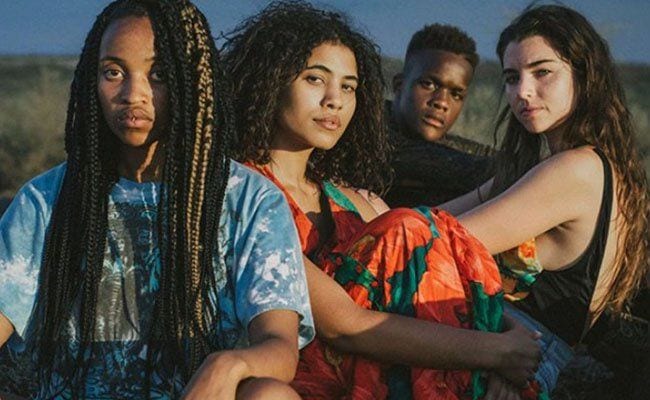
Despite the title and psychedelic posters, High Fantasy, a new film from South African director Jenna Bass (viewed at TIFF 2017), is not at all about drugs. Shot entirely on an iPhone, and following a script co-written by the four young actors in the film, High Fantasy is a complex, thought-provoking exploration of race, gender, and identity.
The story follows four friends (some more loosely defined as “friends” than others) who go on a camping trip and wake to discover that they’ve switched bodies. Most notably, black rights activist Xoli (Qondiswa James, originally) is trapped in the body of the group’s lone white member, Lexi (Francesca Varrie Michel, originally), and two of the other characters change gender. Cutting between found footage and talking head interviews that occasionally break the fourth wall, the 71-minute film focusses on the tension that builds in the group following the switch, and the questions the characters start asking themselves about who they are and who they want to be.
Refreshingly, this is not a film about walking a mile in someone else’s shoes and suddenly discovering that racism and sexism are real — or about discovering that “everyone has problems” regardless of their race and gender. It’s a film about the much more complicated question of whether it’s possible to have a true friendship with someone when the society you live in makes you unequal.
Lexi at one point weakly explains that Xoli has chosen to “separate politics from friendship” for her — a separation that, we see, completely falls apart once the spectre of colonialism is introduced. What starts off as flippantly describing the farm they’re set to camp on as “land that Lexi’s family stole” gradually escalates in intensity until, when Lexi goes missing late in the film, Xoli protests against efforts to find her, screaming that she’ll only spend her energy on black lives, and that it disgusts her that the others are so focussed on Lexi while Lexi is self-centered enough to wander away with no explanation. Lexi also makes a surprising statement — in light of the off-camera interviewer pointing out that “Black people aren’t treated very well” in South Africa — that she hates being white and wishes she were black instead.
It’s hard to unpack any of those moments individually, but the strength of the film is that it’s willing to push past the homilies we’ve all been taught about diversity and cooperation and focus on the messy politics and human feelings underneath. As Thami (Nala Khumalo, originally) points out, he used to cry because he believed so much in the Rainbow Nation, but now that he’s an adult, he understands it was a lie.
From a technical perspective, the film’s greatest strength is its economy. It packs a lot into its runtime, never feeling too short or too long, and wisely doesn’t waste any time explaining how or why the body switching happens. After an initial period of shock, and a short visit from a fifth friend that allows for some fish-out-of-body comedy, the characters just roll with it and take an introspective approach to documenting the experience.
The “found footage” style of the film works better at some points than others. It makes sense that the characters would want to document what’s happened, but there are individual scenes that seem like unlikely candidates for film. There’s a funny moment when Thami asks to bring his giant pizza slice air mattress inside the women’s tent, but in order for this scene to exist, we need to believe that one of the women woke up just as he arrived and started filming the whole conversation. Similarly, toward the end of the film, there’s a tense encounter between Xoli, Lexi, and Thami that’s vital to the story but socially inappropriate to film (in fact, the characters question on screen why Xoli is filming it, and the reason isn’t clear).
The last act of the film also involves a type of meta-commentary from the characters that doesn’t quite fit with the rest of the style. At that stage, Xoli becomes angry about the idea that Lexi is the “main character” in their documentary, at one point seeming to break the fourth wall as she says, “I thought I was part of a process, and now, looking back on it, I see that I was one of the supporting characters.”
While it’s interesting to consider what this film would be like if the talking head interviews were all shot out of character, it doesn’t seem that that’s what happened, and it’s understandable if viewers feel confused about what, if anything, is real versus improv.
On the whole, though, High Fantasy presents an absolutely brilliant take on the science fiction body-switching genre, transforming a device that’s usually used for laughs into one that uncovers deeper truths about the complex nature of identity. While it does deliver some of the expected laughs along the way, the earnestness and vulnerability the cast bring to their roles and the understated style of the film make for a surprisingly thoughtful and challenging experience.


![Call for Papers: All Things Reconsidered [MUSIC] May-August 2024](https://www.popmatters.com/wp-content/uploads/2024/04/all-things-reconsidered-call-music-may-2024-720x380.jpg)



